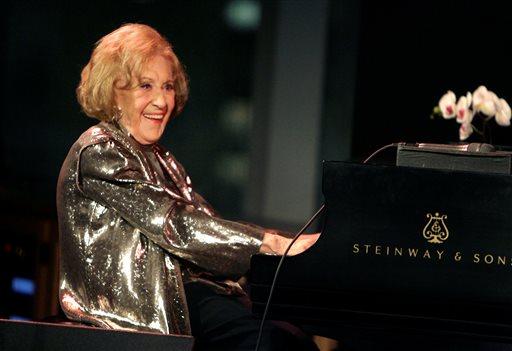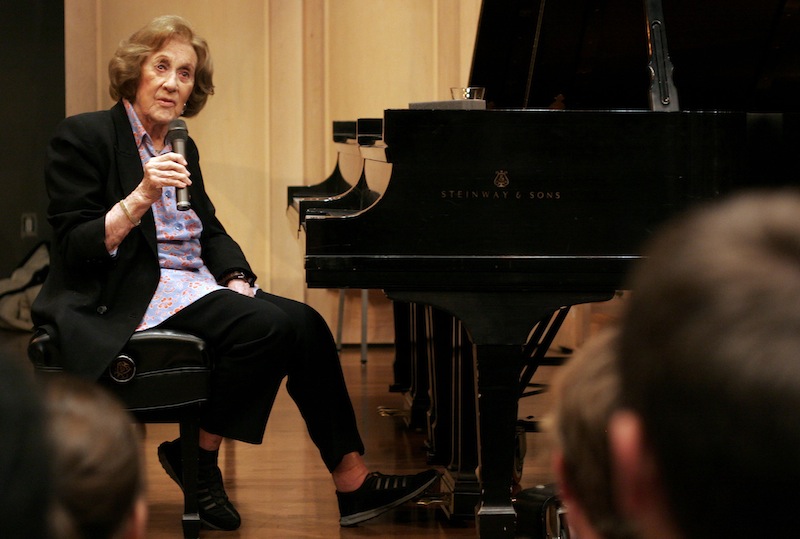NEW YORK — After beginning her career in British music halls, Marian McPartland came to the United States and became a most unexpected jazz star. She forged a distinctive style on piano, made scores of albums and composed music that was recorded by superstars.
But her greatest contribution to jazz came later in life, through her illuminating interviews and impromptu performances with musicians on her long-running NPR program, “Piano Jazz.”
She was 61 when the first “Piano Jazz” episode — with pianist Billy Taylor — aired in 1979. By the time she stepped away from the series in 2011, McPartland had won a Peabody Award for broadcasting and a Grammy Award for lifetime achievement. She also helped a generation learn about jazz through her searching interviews, conducted in her dulcet-toned, sometimes irreverent, British-accented voice.
“Marian McPartland has done more for jazz pianists than anyone in the entire world,” jazz impresario George Wein said in 1991.
McPartland died Aug. 20 at her home in Port Washington, N.Y. She was 95.
Her death was announced by NPR. The cause was not disclosed.
Trained as a classical pianist at a conservatory in her native England, McPartland was drawn to the improvisational freedom of jazz, a world dominated by men and derived from African-American culture.
She succeeded in spite of “three hopeless strikes against her,” as countryman critic Leonard Feather put it 1951: She was British, white and a woman.
Yet she managed to use her background as an outsider, “without American social, racial and class baggage,” to her musical advantage, Paul de Barros wrote in his 2012 biography of McPartland, “Shall We Play That One Together?”
“It allowed her to perceive jazz from the start as a high art,” he wrote.
During the 1950s, McPartland led a trio in New York nightclubs, most notably the Hickory House, and soon became one of the era’s few women to become established as jazz instrumentalists.
She was one of only two women included in Art Kane’s renowned group portrait of jazz musicians on a Harlem street in 1958. She stood in the front row, next to Mary Lou Williams, in the photograph of 57 musicians that became the inspiration for Jean Bach’s Oscar-nominated 1994 documentary, “A Great Day in Harlem.”
McPartland was a pioneering woman in jazz and often appeared at the Mary Lou Williams Women in Jazz Festival at the Kennedy Center. A teenaged Diana Krall called her for career advice, and McPartland often gave air time on “Piano Jazz” to female performers, from Carmen McRae to Norah Jones.
Nonetheless, she was reluctant to identify herself as a feminist. Replying to a question from Ms. magazine co-founder Gloria Steinem at a college forum in 1974, McPartland shrugged off the idea that she had faced discrimination.
“It always seemed like an advantage to be a woman,” she said.
Margaret Marian Turner was born March 20, 1918, in Slough, England, outside London. Her father was an engineer with the British arsenal, and her mother followed the strict class rules of the times.
She began playing piano by ear at age 3, mimicking Chopin compositions that her mother played, but she didn’t take formal lessons until she was 16. After attending girls’ schools, she went to the Guildhall School, a London conservatory, at 17.
When her teachers heard her playing jazz, they warned her away from such “rubbish.” But after a couple of years, she left the conservatory to join a traveling piano-quartet act. Known as Margaret or Maggie to her family, she took the stage name of Marian Page.
After touring England with a vaudeville group, she began entertaining troops in Britain during World War II. In 1943, she joined the USO, which allowed her to travel throughout western Europe, entertaining U.S. soldiers near the front.
She worked alongside Fred Astaire and Dinah Shore, and in 1944 met a raffish cornet player from Chicago named Jimmy McPartland. He was well-regarded in traditional Dixieland jazz circles, and had been friends with Bix Beiderbecke, the tortured jazz genius of the 1920s.
After a quick courtship, they were married in Germany in February 1945.
“The war was on,” McPartland told The Washington Post in 1991. “It was a case of propinquity. . . . I’m sure it sounds awful, but the war was so . . . was so romantic.”
The couple came to the United States in 1946 and settled in Chicago, where McPartland began working with her husband. Before long, though, she became fascinated by the more challenging sounds of bebop. By the time she moved to New York in 1950, she was well on her way to becoming one of the few musicians adept in both traditional and modern styles of jazz.
Longtime jazz critic Nat Hentoff, who has followed McPartland’s career since the 1950s, described her musical strengths in a 2008 Wall Street Journal article:
“Her music . . . portrays a fullness of piano mastery that gives her a secure scope for her improvising . . . she shows that the jazz pulse and luminous beauty are not antithetical.”
For several years in the 1950s, McPartland’s drummer was Joe Morello, who went on to a dynamic career with the Dave Brubeck Quartet. Years later, McPartland acknowledged that she and Morello had a long, intense affair, though both were married to other people.
It was “an insane, besotted love,” McPartland wrote in a personal journal quoted in de Barros’s biography, complete with clandestine meetings at airports, as well as vacations together. The affair lasted about seven years before she broke it off.
She underwent years of psychotherapy and, in the late 1960s, divorced Jimmy McPartland. She and Morello, who died in 2011, never married but remained on friendly terms and had occasional musical reunions. The affair “put me through some terrible changes,” McPartland wrote, “but it was all worth it.”
As early as 1949, she began writing reviews and essays for DownBeat and other musical journals. She collected her writings in “All in Good Time” in 1987 (it was republished in an expanded version in 2005).
She composed songs that were recorded by Tony Bennett, Peggy Lee and Sarah Vaughan, among others, and established her own record label in the late 1960s, when major labels began to drop jazz.
She also turned to broadcasting in the 1960s with a weekly show on WBAI-FM in New York. She played records, conducted interviews and discovered a rare talent for describing the elusive art of jazz, as well as for getting musicians to talk about their lives.
Those were the skills she used to make “Piano Jazz” such a fresh and illuminating show. She and a guest — usually but not always a pianist — would spend an hour playing music together and discussing the performer’s personal story. It made for revelatory radio, as McPartland explored the musical impulses, humor and insights of almost 800 musicians, including Dizzy Gillespie, George Shearing, Ray Charles, Bill Evans, Carmen McRae and Wynton Marsalis.
She often improvised spontaneous musical portraits of her guests, who covered the full range of jazz and included such jazz-loving pop stars as Steely Dan, Elvis Costello and Willie Nelson.
“You really showed me how my songs can work as jazz,” composer Burt Bacharach said when he was on “Piano Jazz” in 2005. “When you played ‘A House Is Not a Home’ and ‘Anyone Who Had a Heart,’ it was incredible. And if you can make ‘I’ll Never Fall in Love Again’ sound good, I can only imagine what you might do with ‘What’s New, Pussycat?’ “
Away from her radio show, McPartland continued to tour and make new recordings after age 90, even after arthritis made it difficult for her to walk. She received a Grammy for lifetime achievement in 2004.
In the 1980s, she and Jimmy McPartland decided “our divorce was a failure,” and they began to share a house on New York’s Long Island. They had no children together.
She had him on “Piano Jazz” in 1990, when he was in his early 80s, and they played and joked together like old times.
“In case you’re wondering what’s going on here,” she said at one point, “we’re having laughs and enjoying ourselves. My guest today is Jimmy McPartland, a gentleman well-known to me, of course.”
On Feb. 27, 1991, at their home, they were remarried 46 years after their first wedding.
Exactly two weeks later, Jimmy McPartland died at 83.
One day after the funeral, McPartland, ever the trouper, was back on the road.
Send questions/comments to the editors.




Comments are no longer available on this story